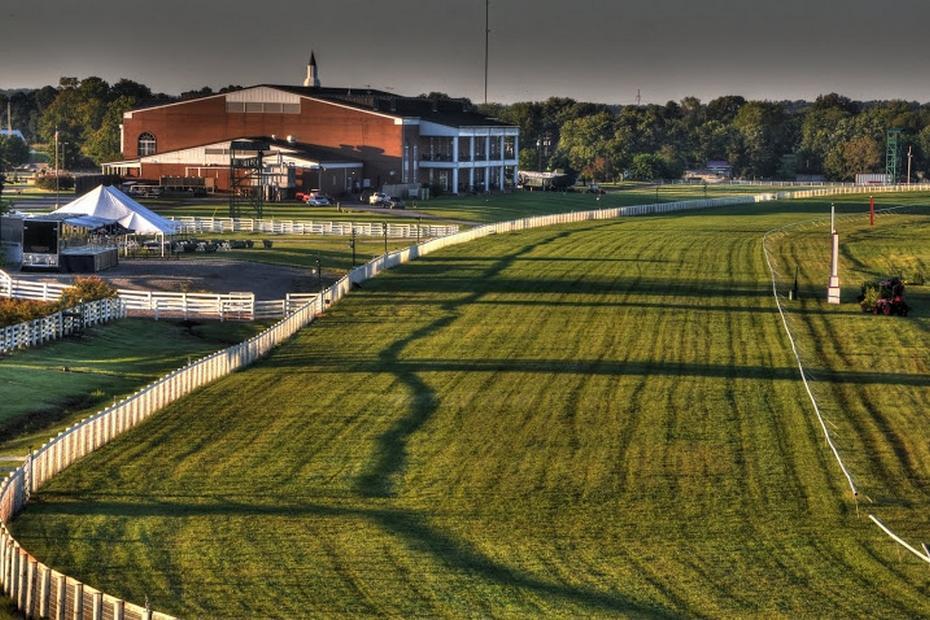
FRANKLIN, Ky. (Thursday, Sept. 17, 2020) — Even before Saffie Joseph won Wednesday’s eighth race with Sugar Fix on closing day of the RUNHAPPY Meet at Kentucky Downs, the trainer’s thoughts had turned to next year.
“First meet here. I love it,” said Joseph, one of America’s fast-rising trainers who this summer expanded his East Coast base to include Kentucky. “It’s a cool setting, different from what you’re used to seeing in America. It’s kind of like a European track. I’m coming back every year. As long as we have the owners providing the horses, we hope to make this an important part of our year.”
Fergus Galvin, a representative for Qatar Racing’s Sheikh Fahad al Thani, said that Guildsman’s victory in the Grade 3 Franklin-Simpson Stakes on the closing card “certainly made Sheikh Fahad a big fan of Kentucky Downs. He’s already wanting to stock up the stable to point to the meeting next year.”
Kentucky Downs smashed its betting records at the six-date meet with total wagering of $59,828,444 on 62 races, including $9,487,705 on Wednesday’s 10-race finale. The previous record was last year’s $41,239,699 for 50 races over five days.
This meet was run without spectators, with horse owners and a limited number of their guests attending the races under social-distancing protocols.
“We love it here,” Kentucky-based trainer Brendan Walsh said before saddling Guildsman to victory in the Franklin-Simpson. “It’s been good to us. We always enjoy coming here. It’s always a nice atmosphere. It’s a shame we don’t have the people this year, but hopefully next year will be different.”
Walsh sent out the meet’s only two-time winner, Born Great. He had a trio of wins, seconds and thirds and noted that just being close can be lucrative at Kentucky Downs.
“Absolutely. We ran second in the 2-year-old stakes and got $94,000 with a 2-year-old filly,” Walsh said, referencing Flown’s finish in the $500,000 The Mint Juvenile Fillies on opening day. “It’s fantastic.”
Purses paid out to horse owners totaled a record $12,337,000 spread over the six days, topping last year’s record total of $11,520,380 paid out over five days. Overnight races (maiden, allowance and claiming) continued to be among the most lucrative in the world, even with a moderate per-race purse reduction forced by the COVID-related two-month shutdown during the spring of the Historical Horse Racing gaming operation.
“It’s a great set-up,” said California-based trainer Doug O’Neill. “Purses are insane. They take care of you. I’d love to see them add a few days to this meet. Sometimes with such a short meet, it’s hard to bring them from California for fear that you won’t get in (your targeted race); there’s not a Plan B. But if they were to have say three weeks of three days a week or something like that, it would open up the door more for people to ship in. Or two weeks, four days a week. The horses are there, and the purses are here. The set-up is here. The management’s here. A few more days would be helpful for the horsemen.”
With the leading riders from both coasts and Kentucky convening at Kentucky Downs, the meet assembled the season’s strongest group of riders at one track outside the Breeders’ Cup. Among those riding at the track for the first time were New York-based reigning Eclipse Award champion Irad Ortiz and California budding superstar Umberto Rispoli. Ortiz’s six wins included three stakes: Imprimis in the $700,000, Grade 3 RUNHAPPY Turf Sprint, Theodora B. in the $500,000 TVG and Outadore in the $500,000 Bal a Bali Juvenile Turf Sprint.
“I really like it,” said Ortiz, the brother of two-time Kentucky Downs leading rider Jose Ortiz. “It’s different than all the other tracks I’ve been riding. It’s not like a regular track, just two turns. This is uphill, downhill, tight turn. I like it. I just have fun. I’m glad I’m able to ride some horses here.”
Rispoli had only two mounts at the meet but one was Lighthouse’s victory in the inaugural $400,000 Music City for California trainer Simon Callaghan.
Tyler Gaffalione added his first Kentucky Downs riding title to his recent meet crowns at Keeneland and Churchill Downs, winning 11 races including stakes on Guildsman, Got Stormy ($500,000, Grade 3 Real Solution Ladies Sprint) and Plum Ali ($500,000 The Mint Juvenile Fillies).
“This is such a fun place to ride,” Gaffalione said. “Great venue. I look forward to coming here every year. It’s a blast. The atmosphere, the people. There’s nowhere else like it. And the money is an extra bonus.”
Mike Maker won a record fifth training title with eight victories, while his client Three Diamonds Farm earned its first owner’s title at the track with four wins.
Donegal Racing’s Arklow, with Florent Geroux riding for trainer Brad Cox, came away with the meet’s richest race, taking the $1 million, Grade 3 Calumet Farm Kentucky Turf Cup for the second time in three years. The Maker-trained Zulu Alpha, last year’s winner, finished third.
Breeze Easy’s Imprimis, trained by Joe Orseno, earned a fees-paid spot in the $1 million, Grade 1 Breeders’ Cup Turf Sprint Nov. 7 at Keeneland by virtue of winning the RUNHAPPY Turf Sprint, a Breeders’ Cup “Win and You’re In” Challenge Series race.
Four-time defending Eclipse Award-winning trainer Chad Brown’s deep stable was a presence at the meet for the first time, his three wins including Flavius in the $750,000 Tourist Mile and Regal Glory in the $500,000, Grade 3 English Channel Ladies Turf. Brown previously had raced only one horse at Kentucky Downs.
Field sizes, for which Kentucky Downs has led America for the past few years, averaged 9.98, down from last year’s eye-catching 11.26 with 12 horses being the maximum that can run. The better races this meet drew exceedingly well, with the 16 stakes races averaging 10.25 horses, including 11.17 for the six sprint stakes. Also notable: The nine first-level allowance races averaged 11.11 horses per race and the 18 non-claiming maiden races 10.33 per race.
Also this meet, Kentucky Downs for the first time utilized Equibase Co.’s Gmax timing and tracking system based on GPS technology, which along with additional high-definition cameras made the broadcast viewing of races much better. Previously, all of Kentucky Downs’ races were hand-timed.
Because the new system had some different and more standard starting positions based on GPS measurements, race times varied significantly and generally were faster from past meets. While the hand-timing continued from the new starting positions as part of Kentucky Downs’ testing, the technology-generated times were the official clockings for the Equibase race charts.
“We can’t thank the horsemen and the horseplayers enough for their support this meet,” said Ted Nicholson, Kentucky Downs’ senior vice president and general manager. “The numbers speak for themselves. We appreciate the Kentucky Horse Racing Commission giving us an additional day this year, and the horsemen took full advantage of it. We had some mishaps and glitches, and each will be scrutinized whether they resulted from human error or were beyond our control. Through it all, our racing was spectacular, which is a credit to our owners, trainers and jockeys and to which bettors across the country enthusiastically responded.
“As far as times and course records, we are going to study the data before making a final determination. But in all likelihood, 2020 will become the baseline year going forward as far as course records. With any new technology, there is a learning curve and hiccups. But we believe the new system is a big step toward addressing the challenges of timing such a unique course as Kentucky Downs.”
Press Release



